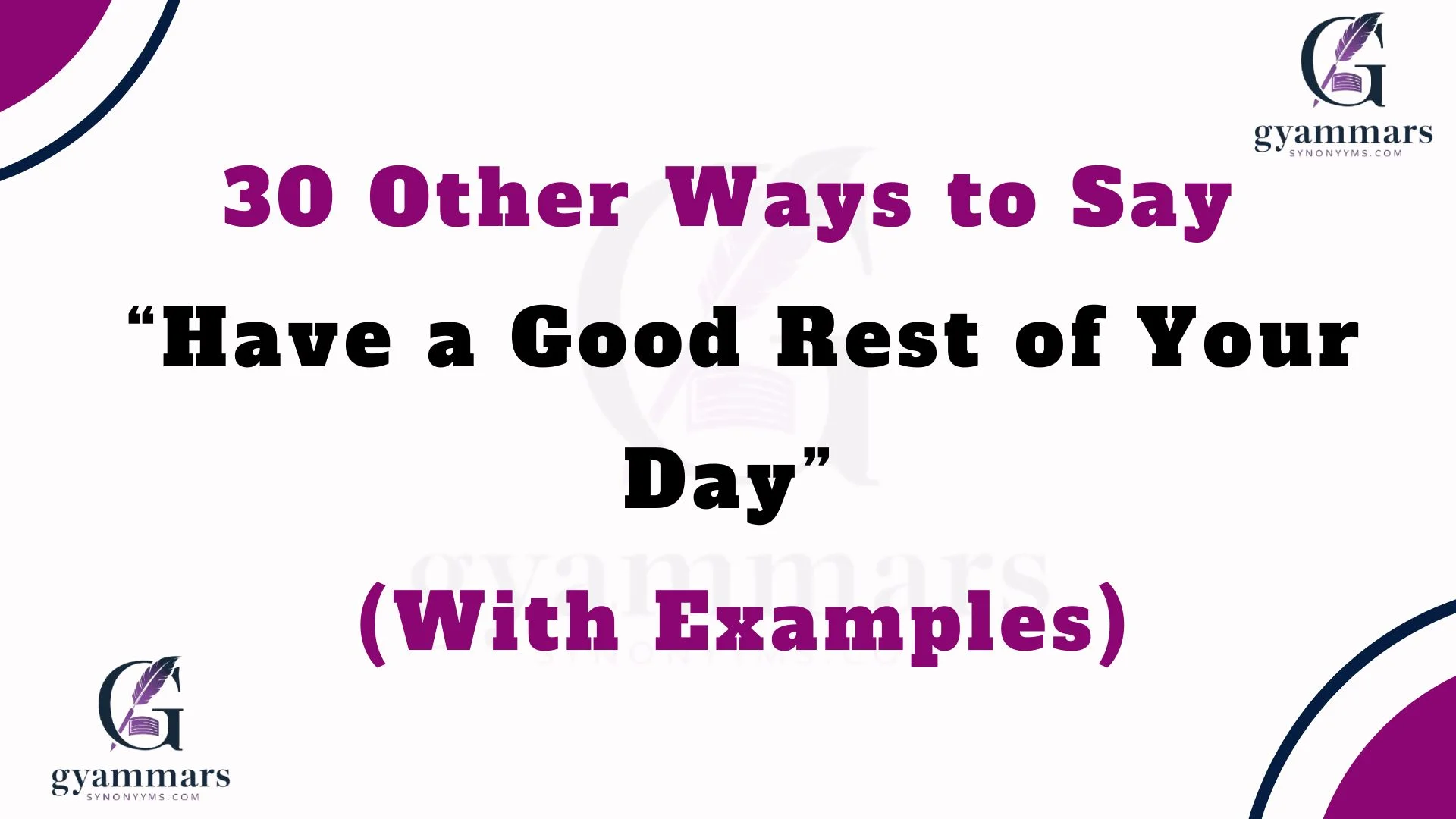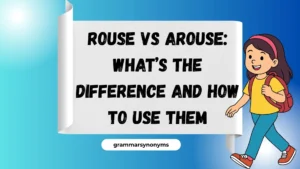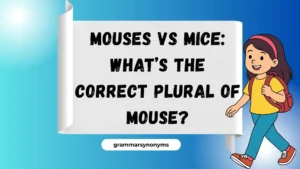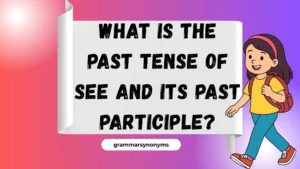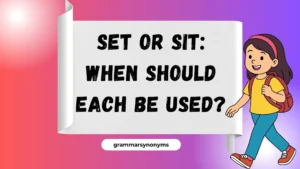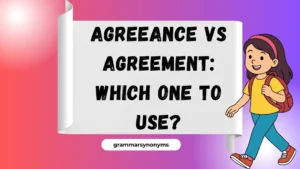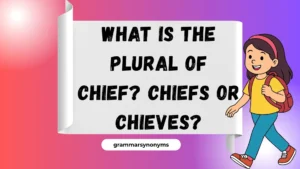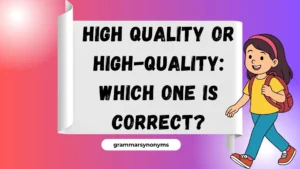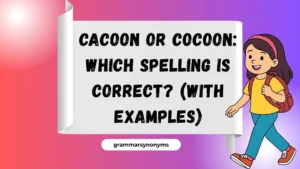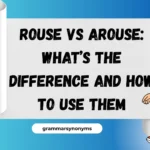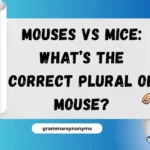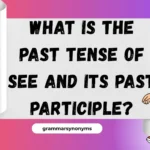Sometimes the simplest words of kindness can leave the biggest impact. When you tell someone “Have a good rest of your day,” you’re offering warmth, positivity, and care. But repeating the same phrase over and over may feel a little generic. Finding thoughtful alternatives can make your message stand out and feel more personal, empathetic, and meaningful.
This article shares 30 other ways to say the same phrase—with definitions, examples, and best uses—so you can choose the perfect expression for any setting, whether casual, friendly, or professional.
What Does “Have a Good Rest of Your Day” Mean?
The phrase “Have a good rest of your day” is a polite, warm way of wishing someone well after a conversation. It acknowledges the part of the day that remains and expresses hope that it goes positively.
Is It Professional/Polite to Say “Have a Good Rest of Your Day”?
Yes. The phrase is both professional and polite. It works in emails, workplace chats, customer service calls, and casual settings. However, alternatives can sometimes feel more polished or more heartfelt, depending on the tone you want to convey.
Pros or Cons
Pros:
- Friendly and caring tone
- Universally understood
- Works in both casual and professional settings
Cons:
- Can feel repetitive if used too often
- Slightly wordy compared to simpler alternatives
- May sound a bit “scripted” in customer service settings
Synonyms For “Have a Good Rest of Your Day”
- Enjoy the Rest of Your Day
- Wishing You a Pleasant Afternoon/Evening
- Take Care for the Rest of the Day
- Hope the Rest of Your Day Goes Well
- Make the Most of Your Day
- Wishing You a Peaceful Evening
- May the Rest of Your Day Be Wonderful
- Hope Your Afternoon Treats You Well
- Have a Relaxing Evening Ahead
- Wishing You a Smooth Rest of the Day
- Stay Well for the Rest of the Day
- Make Today Count
- Have a Joyful Evening
- Hope the Rest of Your Day is Bright
- Take It Easy for the Rest of the Day
- Wishing You Comfort This Afternoon
- Have a Refreshing Evening
- May the Rest of Your Day Be Successful
- Here’s to a Great Afternoon
- Rest Well Later
- Have a Positive Rest of the Day
- Sending You Good Vibes for the Evening
- May the Rest of Your Day Be Peaceful
- I Hope You Find Joy Today
- Wishing You Calm and Happiness
- Have a Lovely Evening Ahead
- Best of Luck with the Rest of Your Day
- Stay Positive This Afternoon
- Enjoy What’s Left of Your Day
- Hope the Evening Brings You Rest
1. Enjoy the Rest of Your Day
Definition: A warm wish encouraging someone to find enjoyment in what’s left of their day.
Detailed Explanation: This alternative feels friendly and optimistic, focusing on enjoyment.
Scenario Example:
- “Thanks for your help today. Enjoy the rest of your day!”
Best Use: Casual conversations, customer service, workplace farewells.
Tone: Friendly, uplifting.
Additional Notes: Works well in both professional and informal emails.
2. Wishing You a Pleasant Afternoon/Evening
Definition: A polite way to hope someone’s remaining time is pleasant.
Detailed Explanation: More formal and professional than “Have a good rest of your day.”
Scenario Example:
- “I’ll follow up tomorrow with the report. Wishing you a pleasant evening.”
Best Use: Professional emails or customer communications.
Tone: Courteous, refined.
Additional Notes: Great for formal business settings.
3. Take Care for the Rest of the Day
Definition: A caring phrase emphasizing well-being.
Detailed Explanation: Suggests both safety and comfort.
Scenario Example:
- “It was nice chatting with you. Take care for the rest of the day.”
Best Use: Personal messages, supportive conversations.
Tone: Warm, empathetic.
Additional Notes: Perfect when showing genuine concern.
4. Hope the Rest of Your Day Goes Well
Definition: Expresses hope for positivity and smoothness.
Detailed Explanation: Shows empathy and thoughtful wishing.
Scenario Example:
- “Good luck with your meeting. Hope the rest of your day goes well.”
Best Use: Workplace, supportive conversations.
Tone: Sincere, encouraging.
Additional Notes: Ideal in professional but caring messages.
5. Make the Most of Your Day
Definition: Encourages productivity and positivity.
Detailed Explanation: Slightly motivational in tone.
Scenario Example:
- “You’ve got some free time now—make the most of your day!”
Best Use: Motivational settings, casual encouragement.
Tone: Energetic, uplifting.
Additional Notes: Sounds more casual than formal.
6. Wishing You a Peaceful Evening
Definition: Conveys a desire for rest and relaxation.
Detailed Explanation: Gentle, soothing, and empathetic.
Scenario Example:
- “It’s been a busy one. Wishing you a peaceful evening.”
Best Use: Personal conversations, caring farewells.
Tone: Calm, caring.
Additional Notes: Not typically used in highly formal business emails.
7. May the Rest of Your Day Be Wonderful
Definition: A warm wish with a touch of elegance.
Detailed Explanation: Formal yet affectionate.
Scenario Example:
- “Thanks again for your time. May the rest of your day be wonderful.”
Best Use: Polite letters, professional or semi-formal notes.
Tone: Respectful, kind.
Additional Notes: Adds a touch of formality.
8. Hope Your Afternoon Treats You Well
Definition: Playful and thoughtful.
Detailed Explanation: Adds a personal, conversational vibe.
Scenario Example:
- “Good luck with the kids’ practice—hope your afternoon treats you well!”
Best Use: Friendly conversations.
Tone: Lighthearted, casual.
Additional Notes: Best for close colleagues or friends.
9. Have a Relaxing Evening Ahead
Definition: Wishes someone downtime and rest.
Detailed Explanation: Focuses on relaxation.
Scenario Example:
- “You’ve worked hard today. Have a relaxing evening ahead.”
Best Use: Supportive messages, after-work conversations.
Tone: Caring, gentle.
Additional Notes: Great for burnout support.
10. Wishing You a Smooth Rest of the Day
Definition: Hopes things go easily and stress-free.
Detailed Explanation: Polite, versatile option.
Scenario Example:
- “Thanks for your quick response. Wishing you a smooth rest of the day.”
Best Use: Work emails, customer service.
Tone: Professional, polite.
Additional Notes: Avoid in very casual chats—it may sound formal.
11. Stay Well for the Rest of the Day
Definition: A caring wish for someone’s well-being.
Detailed Explanation: Highlights health and positivity, not just the mood of the day.
Scenario Example:
- “It was lovely seeing you today. Stay well for the rest of the day.”
Best Use: Personal conversations, wellness-focused settings.
Tone: Caring, thoughtful.
Additional Notes: Best when you want to emphasize health and comfort.
12. Make Today Count
Definition: Encourages someone to use the day meaningfully.
Detailed Explanation: Motivational and slightly inspirational.
Scenario Example:
- “You’ve got a lot ahead of you. Make today count!”
Best Use: Encouraging friends, colleagues, or students.
Tone: Motivational, energizing.
Additional Notes: Works in pep talks or positive encouragement.
13. Have a Joyful Evening
Definition: Wishes happiness for the remaining evening.
Detailed Explanation: Focuses on emotional positivity.
Scenario Example:
- “I hope dinner goes well. Have a joyful evening.”
Best Use: Social conversations, semi-formal notes.
Tone: Cheerful, warm.
Additional Notes: Not as common in workplace emails.
14. Hope the Rest of Your Day is Bright
Definition: Expresses positivity and optimism.
Detailed Explanation: Uses uplifting imagery for encouragement.
Scenario Example:
- “You’ve handled so much today. Hope the rest of your day is bright.”
Best Use: Casual or encouraging farewells.
Tone: Optimistic, uplifting.
Additional Notes: Adds a poetic touch.
15. Take It Easy for the Rest of the Day
Definition: Suggests relaxation and calmness.
Detailed Explanation: Encourages slowing down and resting.
Scenario Example:
- “You’ve earned it—take it easy for the rest of the day.”
Best Use: After work, casual chats.
Tone: Relaxed, supportive.
Additional Notes: Great for informal settings.
16. Wishing You Comfort This Afternoon
Definition: A warm expression wishing peace and comfort.
Detailed Explanation: Softer, more empathetic than “pleasant.”
Scenario Example:
- “Thanks for sharing your time today. Wishing you comfort this afternoon.”
Best Use: Supportive or caring contexts.
Tone: Gentle, empathetic.
Additional Notes: Works well in thoughtful, considerate emails.
17. Have a Refreshing Evening
Definition: Hopes someone finds renewal and energy.
Detailed Explanation: Suggests rest that recharges them.
Scenario Example:
- “After such a busy day, have a refreshing evening.”
Best Use: After long work hours, friendly conversations.
Tone: Supportive, uplifting.
Additional Notes: Good for burnout recovery messages.
18. May the Rest of Your Day Be Successful
Definition: Wishes productivity and achievement.
Detailed Explanation: Encourages a successful outcome.
Scenario Example:
- “Best of luck with your project—may the rest of your day be successful.”
Best Use: Workplace, professional contexts.
Tone: Professional, motivating.
Additional Notes: Great for colleagues or team members.
19. Here’s to a Great Afternoon
Definition: A cheerful way to toast positivity.
Detailed Explanation: Feels friendly and celebratory.
Scenario Example:
- “Thanks for the meeting—here’s to a great afternoon!”
Best Use: Friendly workplace or casual settings.
Tone: Cheerful, upbeat.
Additional Notes: Sounds more informal.
20. Rest Well Later
Definition: Encourages relaxation at the end of the day.
Detailed Explanation: A caring phrase focused on rest.
Scenario Example:
- “You’ve had a long shift. Rest well later.”
Best Use: Personal, supportive notes.
Tone: Caring, gentle.
Additional Notes: Best for close friends or family.
21. Have a Positive Rest of the Day
Definition: Wishing positivity in mood and experience.
Detailed Explanation: Focuses on mindset and outcome.
Scenario Example:
- “Don’t stress too much—have a positive rest of the day.”
Best Use: Workplace, motivational messages.
Tone: Optimistic, encouraging.
Additional Notes: Sounds professional yet warm.
22. Sending You Good Vibes for the Evening
Definition: Playful way of offering encouragement.
Detailed Explanation: More casual, expressive, and modern.
Scenario Example:
- “Big presentation? Sending you good vibes for the evening!”
Best Use: Friendly, informal settings.
Tone: Fun, supportive.
Additional Notes: Better with peers than supervisors.
23. May the Rest of Your Day Be Peaceful
Definition: A gentle wish for calm and relaxation.
Detailed Explanation: Focused on serenity and inner balance.
Scenario Example:
- “You’ve been through a lot today. May the rest of your day be peaceful.”
Best Use: Supportive, caring contexts.
Tone: Gentle, calming.
Additional Notes: Works beautifully in empathetic communication.
24. I Hope You Find Joy Today
Definition: Focuses on happiness in small or big moments.
Detailed Explanation: Warmer and more personal than generic wishes.
Scenario Example:
- “You deserve some smiles—I hope you find joy today.”
Best Use: Personal conversations.
Tone: Warm, heartfelt.
Additional Notes: Less formal, but very thoughtful.
Read More: 30 Other Ways to Say “How Was Your Day” (With Examples)
25. Wishing You Calm and Happiness
Definition: Balances peace and joy in a wish.
Detailed Explanation: Shows care for both emotional state and well-being.
Scenario Example:
- “It’s been hectic lately. Wishing you calm and happiness.”
Best Use: Supportive contexts, personal connections.
Tone: Gentle, caring.
Additional Notes: Strong in empathetic notes or texts.
26. Have a Lovely Evening Ahead
Definition: A polite, soft way of sending kind wishes.
Detailed Explanation: Polished and universally appropriate.
Scenario Example:
- “It was great connecting. Have a lovely evening ahead.”
Best Use: Professional or personal.
Tone: Polite, kind.
Additional Notes: Neutral enough for many contexts.
27. Best of Luck with the Rest of Your Day
Definition: Offers encouragement for upcoming tasks.
Detailed Explanation: Combines positivity with support.
Scenario Example:
- “Your schedule looks full—best of luck with the rest of your day.”
Best Use: Workplace, task-focused conversations.
Tone: Encouraging, professional.
Additional Notes: Perfect before deadlines.
28. Stay Positive This Afternoon
Definition: Motivates optimism and resilience.
Detailed Explanation: Encourages maintaining a good mindset.
Scenario Example:
- “It’s a tough day, but stay positive this afternoon.”
Best Use: Motivational chats.
Tone: Supportive, hopeful.
Additional Notes: Sounds uplifting but less formal.
29. Enjoy What’s Left of Your Day
Definition: Encourages enjoyment of remaining time.
Detailed Explanation: Very close to the original phrase, but more casual.
Scenario Example:
- “Thanks again for stopping by. Enjoy what’s left of your day.”
Best Use: Everyday farewells.
Tone: Friendly, casual.
Additional Notes: Works for both casual and semi-professional use.
30. Hope the Evening Brings You Rest
Definition: Wishing someone peaceful rest later.
Detailed Explanation: Combines care with relaxation.
Scenario Example:
- “You’ve earned it—hope the evening brings you rest.”
Best Use: Caring, supportive contexts.
Tone: Gentle, warm.
Additional Notes: Great for close or empathetic conversations.
Conclusion
When you choose alternatives to “Have a good rest of your day,” you add layers of warmth, care, professionalism, or encouragement depending on the situation. The right phrase can uplift a friend, comfort a colleague, or show genuine appreciation in customer service. Language is powerful—and these options help you use it in thoughtful ways.
FAQs:
1. What’s the most versatile alternative?
“Enjoy the rest of your day” works in almost any situation.
2. Which option is best for professional emails?
“Wishing you a pleasant afternoon/evening” is the most polished.
3. Which alternatives show the most care?
“Hope the evening brings you rest” and “Wishing you calm and happiness” feel very caring.
4. Can I use casual alternatives in workplace chats?
Yes, but choose ones like “Take care for the rest of the day” or “Hope the rest of your day goes well.”
5. Why do alternatives matter?
They help your words feel fresh, empathetic, and tailored to each situation.

“Mia Rose at Grammar Synonyms is your ultimate guide to mastering language with style and precision. Whether you’re looking to enhance your vocabulary, perfect your grammar, or discover the ideal synonym, Mia Rose offers expert resources and creative solutions to help you express yourself flawlessly. With Grammar Synonyms, unlock a world of language possibilities and elevate every piece of writing you create.
